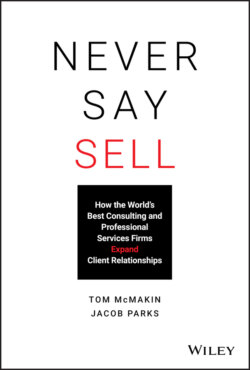Читать книгу Never Say Sell - Tom McMakin - Страница 20
Grinders, Minders, and Finders
ОглавлениеIn consulting, there are grinders, minders, and finders: those who do the work, those who manage others doing the work, and those who land new work for others to manage. For two years, Charlie was a grinder, trundling from project to project – deep in the salt mines of large projects, doing the work.
But because of that work, and his ability to do it well, he was quickly promoted to manager. He says, “My job as manager was to lead projects. A partner would sell a project and define its scope. As a manager, I'd be responsible for corralling the team and getting them pointed in the right direction to make sure the scope was delivered and it was to the client's liking.”
That's when Deloitte sent him to Deloitte University in Westlake, Texas, where he and his fellow newly minted project managers learned how to set expectations with those on their teams and how to manage them in a way that produced results. They learned how to be minders.
Charlie quickly learned it was important to build his brand within the firm. He says, “You need to become known for something. Be the go-to person for the firm on a specific subject and develop a track record of excellent delivery with a handful of partners. As they sell more, they will request you to run their projects, and, over time, they will begin to fold you into the business development process.”
Charlie was being groomed to be a finder. He explains, “The partner's job on a project is to manage the project as a whole and to ensure the client's needs are met. As I worked with several partners, they began to trust me more, and I got more and more responsibility, including exposure to business development.”
Partners would use Charlie to help prepare decks, do research on a proposed project, and join them in presenting to clients. He wasn't expected to drive business development, yet, so much as to absorb what he saw by osmosis.
Charlie recalls, “Working on a proposal with a partner led to me being staffed on that project. I was absolutely incentivized to do a good job on the proposal, but I was not incentivized or rewarded if that proposal turned into a sale. That went to the partner.”
Charlie left Deloitte before taking the next step – a promotion to senior manager, deciding instead to co-found Capstone Event Group, a firm that manages running races (Capstone just added San Francisco's Bay to Breakers franchise to their growing stable). As Charlie describes it, his firm “has been able to give some really special community events a long-term home by acquiring them and managing them effectively.”
If Charlie had stayed at Deloitte, he would have likely, over time, moved into a finder role. He expands,
As a senior manager, I would have begun to have goals that were tied directly to sales. A senior manager is, essentially, a partner-in-training. That's when it starts to shift, and Deloitte takes a person who has historically been rewarded and promoted based on analytics and then on their ability to manage, to a place where they are rewarded for new business. It is a slow ramp, but eventually you get to try and win new business, which is the road to being partner; and once you are a partner, of course, business development is what it's all about.
I think the core message Deloitte tried to send, culturally, was that partners want to help bring people along. You were never just given a sales goal. To the contrary, with fewer senior people, the message was do good work, establish strong relationships, and over time you will get pulled into the sales process.
Call this the “partner's imperative.” If you want to drink from the cool, clear waters of profit participation in an expert services firm, you have to be prepared to make it rain. Both Deloitte and Charlie were clear about this from the start.
